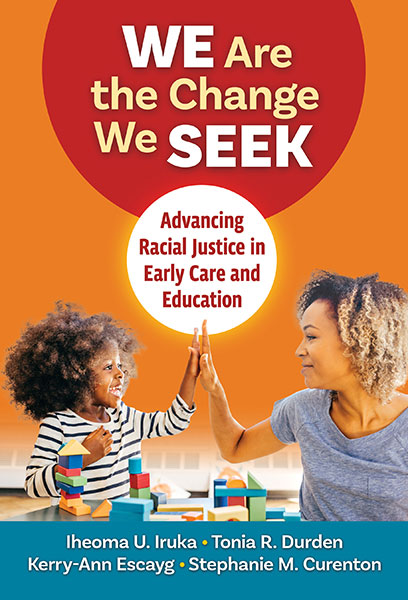Professors: Request an Exam Copy
Print copies available for US orders only. For orders outside the US, see our international distributors.
Iheoma U. Iruka, Tonia R. Durden, Kerry-Ann Escayg, Stephanie M. Curenton
Publication Date: June 23, 2023
Pages: 168
Series: Early Childhood Education Series

“This book lays a clear foundation that you can grasp and start using in your everyday work with Black and Brown children and their families in any setting. It motivated and moved me to my core like no other book has.” —Dawn A. Yazzie, faculty, Georgetown University
This timely book will help early care and education teachers, leaders, administrators, coaches, and staff deliver on the promise of high-quality education for all children.
The authors provide inspiration, practical tools, and resources through the culturally responsive, anti-bias, anti-racist (CRABAR) framework. This teacher-friendly text shows how to engage in self-inquiry and evaluate current classroom practices while embedding new ones that advance the learning and well-being of children, especially those from minoritized and poor communities. Readers will find tools and assessments to support the implementation of culturally grounded practices that will improve outcomes for diverse children in early childhood settings and systems.
We Are the Change We Seek connects history to current events, supports self-inquiry, encourages a shift in mindset and, most importantly, offers guidance for creating affirming and joyful spaces for young children to learn.
Book Features:
Iheoma U. Iruka is a research professor in public policy and the founding director of the Equity Research Action Coalition at the Frank Porter Graham Child Development Institute at The University of North Carolina at Chapel Hill. Tonia R. Durden is a clinical professor and birth through five program coordinator in the Department of Early Childhood and Elementary Education at Georgia State University. Kerry-Ann Escayg is an associate professor of teacher education at the University of Nebraska–Omaha. Stephanie M. Curenton is a professor and director of the Center on the Ecology of Early Development program at Boston University.
“This book lays a clear foundation that you can grasp and start using in your everyday work with Black and Brown children and their families in any setting. It motivated and moved me to my core like no other book has. It validates what I think about for my children and future generations.”
—Dawn A. Yazzie, faculty, Georgetown University
“This book is not only relevant but timely as there is a massive pushback to racial equity work within our society. Focusing on practical strategies such as CRAB and anti-racist pedagogies, this book equips teachers and other early childhood professionals with the knowledge and skills necessary to create equitable learning spaces for our youngest children. It not only reminds us that we have the collective power to make a difference, but that it is our responsibility as early childhood practitioners, educators, and professionals.”
—Ebonyse Mead, president, Educational Equity Institute
“I dare anyone to read this book and argue that racism is not a significant, present harm to Black children. This much-needed book makes the case that we are all responsible for de-centering whiteness in our curriculum, teaching, and assessments, and then offers a set of tools to do so. The authors define racial equity terms and frameworks through the lens of early childhood education. They push us to recognize and fight against racism in our systems and in ourselves.”
—Jennifer Keys Adair, author, Segregation by Experience: Agency, Racism, and Learning in the Early Grades; professor and director of the Agency and Young Children Research Collaborative, The University of Texas at Austin
Contents
Acknowledgments vii
Introduction 1
How to Use This Book 2
1. Racism’s Past, Present, and Future 3
What Is Racism? 3
The Effects of Racism in the United States 11
An Intersectionality Lens 18
Now What? 21
2. Connecting Culturally Responsive, Anti-Bias, and Anti-Racist (CRABAR) Practices 23
Anti-Racism and Anti-Bias 24
Terminology Matters: Defining Bias and Racism 25
Racism in Early Childhood Education 26
Introducing the CRABAR Framework 27
Now What? 38
3. Creating CRABAR Learning Environments 41
Spaces for Belonging: Model Learning Environments 42
The Classroom Environment: A Review 43
Reflection on Afrocentric Classroom Environments 44
Prepare to Develop Anti-Racist Classroom Environments 45
Now What? 58
4. Developing a CRABAR Assessment View 61
Purposes of Assessment 62
Using a CRABAR Lens for Assessment of Classroom Quality 68
Emerging CRABAR Assessments 75
Now What? 79
How Assessments Should be Used 81
5. Valuing the Early Childhood Workforce to Sustain CRABAR Practices 83
The Vast Role and Limited Compensation for ECE Professionals 84
Low and Inequitable Wages for ECE Professionals Explained by Legacy of Racism and Sexism 85
Now What? 97
6. Using the RICHER Approach to Elevate the CRABAR Practices 99
Deference to Whiteness in ECE Settings 101
The RICHER Framework 103
Now What? 116
Conclusion 121
Resources 123
References 125
Index 143
About the Authors 155
Land Acknowledgement 155
Body Acknowledgment 157
Professors: Request an Exam Copy
Print copies available for US orders only. For orders outside the US, see our international distributors.